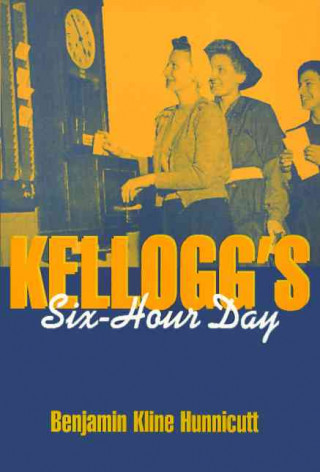
Delivery
Shopping guide





Doesn't suit? No problem! You can return within 30 days
 Gift voucher
any value
Gift voucher
any value
You won't go wrong with a gift voucher. The gift recipient can choose anything from our offer.
Kellogg's Six-Hour Day
 English
English
 111 b
111 b
 COMING SOON
COMING SOON
 Date unknown
Date unknown
 Delivery to Austria
Delivery to Austria
30-day return policy
You might also be interested in


On December 1, 1930, at the start of the Great Depression, W.K. Kellogg replaced the traditional three daily eight-hour shifts in his cereal plant with four six-hour shifts. By adding on a new shift he and his managers created jobs for employees that the company had laid off and for other unemployed persons in Battle Creek, Michigan. Kellogg's six-hour day was the pinnacle of a hundred-year process that cut working time virtually in half. Kellogg Management, propelled by a vision of Liberation Capitalism, insisted that six hours would revolutionize society by shifting the balance of time from work to leisure - from economic concerns to the challenge of freedom. Kellogg's employees, like centuries of workers, believed that work was a means to an end. An overwhelming number of employees were willing to "share their work" and found the extra time an opportunity to invest in the family, community, church, and individual freedom.When World War II ended, Kellogg's managers abandoned the six-hour shift and began with the rest of the nation to define progress as more work for more people. Losing sight of the original dream of more time to live outside necessity, management argued that work should remain the center of life, providing identity, meaning, and purpose to an otherwise meaningless existence. Hunnicutt documents the struggle of those workers, mostly women, who resisted management and the new beliefs about work's centrality. They fought to keep their six-hour shifts until 1985, and in the process preserved the century-old vision of "progressive shortening of the hours of labor."Their story is a monument to workers' struggle for control over their lives and for substantial freedom beyond necessity. It serves as a reminder of a remarkable vision of progress, offering hope and guidance to the last decade of this century when layoffs, downsizing, mandatory overtime, and a "jobless future" plague the nation. Benjamin Kline Hunnicutt is Professor of Leisure Studies at the University of Iowa. He is also the author of "Work Without End: Abandoning Shorter Hours for the Right to Work" (Temple).
About the book
 English
English
Categories


 Contact
Contact How to shop
How to shop
























